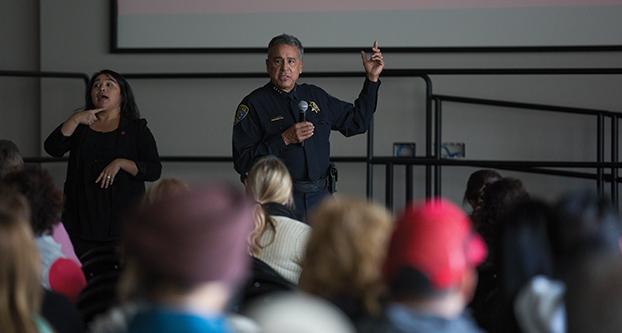Recent events at UC Merced and at Fresno State have called into question the safety of our campuses and the effectiveness of the campus police forces in the event of a possible threat.
“Your safety is the very most important thing to us,” Fresno State President Joseph I. Castro said in his opening statement at a public safety forum held on Thursday. “Our students can’t thrive, we can’t thrive without feeling safe.”
Castro then went on to acknowledge Univeristy Police Chief David Huerta and the entire force for working quickly and effectively in arresting the suspect who posted online threats to the Fresno State campus.
“Campus safety was our highest priority, and all the decisions and actions that were taken were in the best interest of our campus and the safety of our campus community,” Vice President for Administrative Services Deborah Adishian-Astone said.
She said the timeframe in which the threat was made and the subsequent investigation and arrest were all very quick, and, in that time, the police force worked on apprehending the suspect while the university worked on getting official campus communications out.
“It was very impactful to see how our campus community came together in support and care, working together to ensure that our students, faculty, and staff were safe and that the care and attention was there at all times,” Adishian-Astone said.
Huerta equated the threat to a “ticking time bomb” because there was a specific time set in the threat. Huerta said the police force had a lot of challenges including obtaining the IP address of the suspect from Yik Yak.
Huerta also said the police force was faced with many questions like whether to increase the number of officers and cause alarm, evacuate the campus and possibly set up an inadvertent trap for students, how to get children at centers on campus back to their parents and also how to deal with University High School, which has a lockdown procedure that differs from Fresno State’s “shelter-in-place” procedure.
“Sending that first bit of information out is the tipping point,” Huerta said. “It tips over a large response both on campus and from off campus, and we have to be very mindful of that.”
Huerta said that some of the emergency alert communication services, like the Bulldog Alerts, loudspeaker and Twitter are immediate, and other communication services like email and fresnostate.edu have a slight delay.
Huerta said that if a person doesn’t hear about an emergency from one of these sources, then that person doesn’t have official information. Huerta said that the police force and the university are working on bridging the gaps between information on social media and official communication services.
A lot of the questions that were asked at the forum came from the Henry Madden Library staff. The library was told to stay open, and the staff and students felt especially vulnerable to the threat, even more so because a picture of the library appeared on the threatening post.
Library staff members said that students who worked at the front circulation desk feared for their safety. Though these students were not officially told to leave campus, many of them did.
Castro said that the problem with students acting on their own and leaving the campus is that they could be enhancing their own risk. Adishian-Astone said that the university is working on making campus communications more effective.
Library staff members said that they would have felt safer if they had been allowed to lock the doors until they knew that the campus was safe.
Huerta said that after some assessment, the police force concluded that the library was not the target location. Huerta said he didn’t think about the emotional impact it had on the library staff and apologized for the insensitivity.
Castro said that he and his cabinet made the decision to keep the library open, and he took full responsibility for that decision.
“These are judgement calls that we in the end have to make as information becomes available,” Castro said. “The big takeaway on communication is earlier and clearer, and I think that we have been able to do that, and we will in the future.”
Another concern was what to do with children on campus in places like the Autism Center in the event of an emergency. Staff working at the center did not know what to do or how much information to divulge to parents.
Adishian-Astone said that the university would like to meet with staff from places like the Autism Center and work on what the university could do to facilitate emergency procedures and work on making the Fresno State website a place where parents can go to find up-to-date information.
Adishian-Astone addressed another concern about the inability to lock doors from the inside, or even barricade doors because they open outward. She said that there are plans to look into those types of doors.
Huerta said that the police force is in the process of hiring five new officers, bringing the total number to 25 officers. Huerta also said that the police force had been and will continue to engage in emergency preparedness training.
“I promise you that we will take the information from today and what we’ve learned since last week and apply it and position us better for what I hope would never happen again,” Castro said. “We need to be prepared for the possibility of what would happen, and we’ll be in a much stronger position now because of this experience.”




